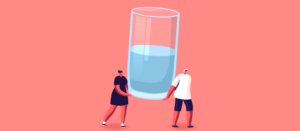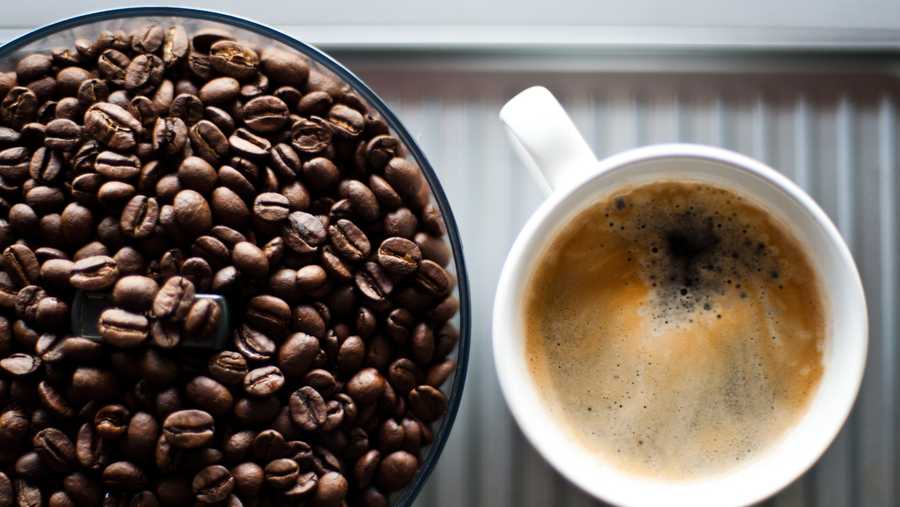Are you struggling to lose weight? Are you convinced that coffee is the reason why you can’t seem to shake those last few pounds? You’re not alone. A lot of people think that coffee is responsible for weight gain. But is this really true? In this blog post, we will explore the relationship between caffeine and weight gain. We will look at scientific research on the matter and see what the experts have to say. Stay tuned – you might be surprised by what you learn!
Contents
Defining Coffee
 Coffee is a brewed drink prepared from roasted coffee beans, which are the seeds of berries from the Coffea plant. The genus Coffea is native to tropical Africa, Madagascar, Comoros, Mauritius, and Réunion in the Indian Ocean. The plant was exported from Africa to countries around the world and coffee plants are now cultivated in over 70 countries, primarily in the equatorial regions of the Americas, Southeast Asia, India, and Africa.
Coffee is a brewed drink prepared from roasted coffee beans, which are the seeds of berries from the Coffea plant. The genus Coffea is native to tropical Africa, Madagascar, Comoros, Mauritius, and Réunion in the Indian Ocean. The plant was exported from Africa to countries around the world and coffee plants are now cultivated in over 70 countries, primarily in the equatorial regions of the Americas, Southeast Asia, India, and Africa.
Coffee beans contain caffeine, a psychoactive compound that has stimulating effects on the human body. Coffee is one of the most popular drinks in the world and millions of people drink it every day. The beans can be ground and brewed to make hot coffee or cold brew coffee.
Types of coffee
The different types of coffee include:
Espresso: It is a strong, concentrated form of coffee that is made by forcing hot water under pressure through finely-ground coffee beans.
Americano: It is a type of coffee that is made by adding hot water to espresso. It is also known as a “long black”.
Cappuccino: It is a type of coffee that is made with espresso, steamed milk, and foam. You can also add chocolate or cinnamon to your cappuccino.
Latte: It is a type of coffee that is made with espresso and steamed milk. You can also add flavors to your lattes, such as vanilla or hazelnut.
Mocha: It is a type of coffee that is made with espresso, chocolate, and steamed milk. It is also sometimes called a “chocolate latte”.
Coffee and Weight Gain
 Now that we know about coffee and it’s types, let’s explore the relationship between coffee and weight gain. The first thing to understand is that weight gain occurs when you consume more calories than you burn. So, if you’re drinking coffee and not offsetting the calories with exercise or healthy eating, then you will likely gain weight.
Now that we know about coffee and it’s types, let’s explore the relationship between coffee and weight gain. The first thing to understand is that weight gain occurs when you consume more calories than you burn. So, if you’re drinking coffee and not offsetting the calories with exercise or healthy eating, then you will likely gain weight.
However, it’s important to note that coffee itself doesn’t have any calories. It’s the added milk, cream, sugar, and flavorings that can cause weight gain. For example, a 16-ounce mocha from a popular coffee chain can have over 500 calories!
Additionally, some research has shown that caffeine may actually help with weight loss. One study found that people who took a caffeine supplement burned more calories than those who didn’t. So, if you’re looking to lose weight, you might want to consider adding coffee to your diet. Another study found that people who drank four cups of coffee a day were 11% less likely to be obese than those who didn’t drink any coffee.
According to the research, it seems that coffee is not to blame for weight gain. So, if you’re struggling to lose weight, you might want to cut back on other things like sugary drinks or snacks instead of giving up coffee.
How Does Coffee Affect the Body?
The active ingredient present in coffee is known as caffeine. Caffeine is a stimulant that acts on the central nervous system. It increases alertness, wakefulness, and energy levels. Other effects of coffee include:
Increased heart rate
Heart rate is the number of times your heart beats in one minute. Coffee can cause an increase in heart rate, which can be dangerous for people with heart conditions. It is important to talk to your doctor if you have a heart condition and want to drink coffee.
Anxiety
Anxiety is a feeling of worry, nervousness, or fear. It is one of the most common side effects of coffee. If you are prone to anxiety, you might want to avoid coffee or limit your intake. It can worsen anxiety symptoms and make them more difficult to manage.
Dehydration
 Dehydration is when your body doesn’t have enough water. Caffeine can cause dehydration because it is a diuretic, which means it makes you urinate more. If you drink coffee, make sure to stay hydrated by drinking plenty of water throughout the day.
Dehydration is when your body doesn’t have enough water. Caffeine can cause dehydration because it is a diuretic, which means it makes you urinate more. If you drink coffee, make sure to stay hydrated by drinking plenty of water throughout the day.
Elevated blood pressure
Elevated blood pressure is when your blood pressure is higher than normal. Coffee can cause an increase in blood pressure, which can be dangerous for people with hypertension. The reason coffee affects blood pressure is that it causes the release of adrenaline. Adrenaline is a hormone that increases heart rate and blood pressure.
Increased urination
Being a diuretic, coffee can cause you to urinate more. This is because caffeine increases the amount of water that is flushed out of your body through urine. If you drink coffee, make sure to stay hydrated by drinking plenty of water throughout the day.
Insomnia
Insomnia is when you have difficulty falling asleep or staying asleep. Caffeine can make it harder to fall asleep and can cause you to wake up more during the night. If you have trouble sleeping, avoid drinking coffee in the evening or limit your intake.
Restlessness
Coffee can cause restlessness, which is when you have difficulty sitting still or staying calm. This is because coffee is a stimulant and can increase your heart rate and energy levels. If you are prone to restlessness, you might want to avoid coffee or limit your intake.
So there you have it! Coffee isn’t to blame for weight gain, and it may even help with weight loss. Just be sure to limit your intake if you’re prone to anxiety or insomnia. And, as always, drink plenty of water!
How Much Coffee Should You Drink?
 The amount of coffee you should drink depends on your caffeine tolerance. If you’re new to drinking coffee, start with one cup a day and see how you feel. If you don’t notice any negative effects, then you can gradually increase your intake. However, it’s important to remember that everyone is different and some people may be more sensitive to caffeine than others.
The amount of coffee you should drink depends on your caffeine tolerance. If you’re new to drinking coffee, start with one cup a day and see how you feel. If you don’t notice any negative effects, then you can gradually increase your intake. However, it’s important to remember that everyone is different and some people may be more sensitive to caffeine than others.
If you’re pregnant or breastfeeding, it’s best to limit your coffee intake to 300 mg per day. And if you have a heart condition, high blood pressure, or anxiety, you should speak with your doctor before drinking coffee.
Overall, moderate coffee consumption – one or two cups per day – is safe for most people and can actually have some health benefits. So, if you’re looking to improve your diet, you don’t need to give up coffee. Just be sure to monitor your intake and make sure you’re offsetting the calories with exercise or healthy eating.
Conclusion
So, is coffee ruining your diet? The answer is probably not. However, if you’re consuming large amounts of caffeine every day, it could be having an impact on your weight loss efforts. If you’re struggling to lose weight, cutting back on caffeine may help give you the boost you need. Remember, moderation is key when it comes to coffee and weight gain. Enjoy your cup of joe in moderation and you’ll be just fine!
Coffee isn’t the only beverage that can impact your weight loss efforts. Be sure to watch your intake of sugary drinks, alcohol, and even fruit juice. Too much of any of these can lead to weight gain. Stick to water or unsweetened tea for the best results. Lastly, proper nutrition and exercise are still the most important factors in any weight loss journey. So, don’t forget to focus on those as well!
For more tips on healthy and effective ways of weight loss, contact Mantra Care. We can help you develop a healthy weight loss program that is tailored to your specific needs and goals. You can also consult with a registered dietitian or nutritionist through our online nutrition counseling program if you have any questions or concerns about starting a new diet.


